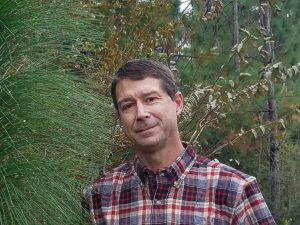As part of the Oxford Conference for the Book, Mark Hainds and Rex Jones will present their connected works about the U.S.-Mexico border — Hainds’s novel “Border Walk” and Jones’s film “La Frontera” — in a panel at 8:00 tonight at the Powerhouse. The event will feature a discussion, a screening of the film and a Q&A session.

Photo courtesy Zachary Hollingsworth
Hainds was the research coordinator for the Longleaf Alliance and a research associate with Auburn University before he dropped out of both in November 2014 in order to walk the entire 1,000-mile length of the U.S.-Mexico border. He was perhaps the first person in history to do so.
“From right-wing ranchers to cowboy poets to human-rights activists to fence or wall opponents, Hainds met a myriad of people along the way who were eager to discuss the balance between border security and immigration justice,” reads the conference program’s description of Hainds’s book.
Of course, one doesn’t just drop everything to risk his or her life on a 1,000-mile trek without a good reason.
“I attribute my decision to walk the Texas-Mexico border to a mid-life crisis,” Hainds said. “I had taken on too many responsibilities, and I was utterly burned out. I needed a clean break, a chance to test myself against something significant and to figure out where I was going next.”
Jones, a documentarian for the University of Mississippi’s Southern Documentary Project, found out about Hainds’s journey while researching another film. The two were talking on the phone when Hainds offhandedly mentioned that he was about to head out on his journey.
“That physical feat alone was enough to pique my interest, but back in 2015, as the rhetoric over a border wall was heating up, I knew the film could also be very topical in exploring the tension between immigration justice and border security,” Jones said.
Supported by the Southern Documentary Project, Jones followed and recorded Hainds for a period of eight weeks from Oct. 27 to Dec. 21, 2014. That film became “La Frontera,” a feature-length documentary about Hainds and his walk across the border.
To say that the two were a little hesitant to take the trip would be an understatement.
Along with having to face, in Hainds’s words, “extreme weather, speeding automobiles, undocumented immigrants, drug runners, suspicious law enforcement (and) really mean dogs,” Jones was concerned about “horrific violence and unbridled chaos on both sides of the border.” Jones also said he was advised on multiple occasions to carry a weapon, although he ended up not doing so.
Both found that, upon arrival, border life was far different from what they had been told to expect.
“(The border is) a place that almost nobody understands unless they live there,” Jones said. “Reports of anarchy on the American side were grossly exaggerated, and I never felt concerned for my safety.”
By the end, the experiences they had and the people they met were unlike any other on Earth.
Hainds’s and Jones’s stories are just two of the multitude being shared during the Oxford Conference for the Book.
“There’s something for everyone at this conference,” said Jimmy Thomas, director of the conference. “Speaking from experience, there have been occasions where I didn’t know that I was particularly interested in a subject but I discover something that sticks with me for years to come.”






